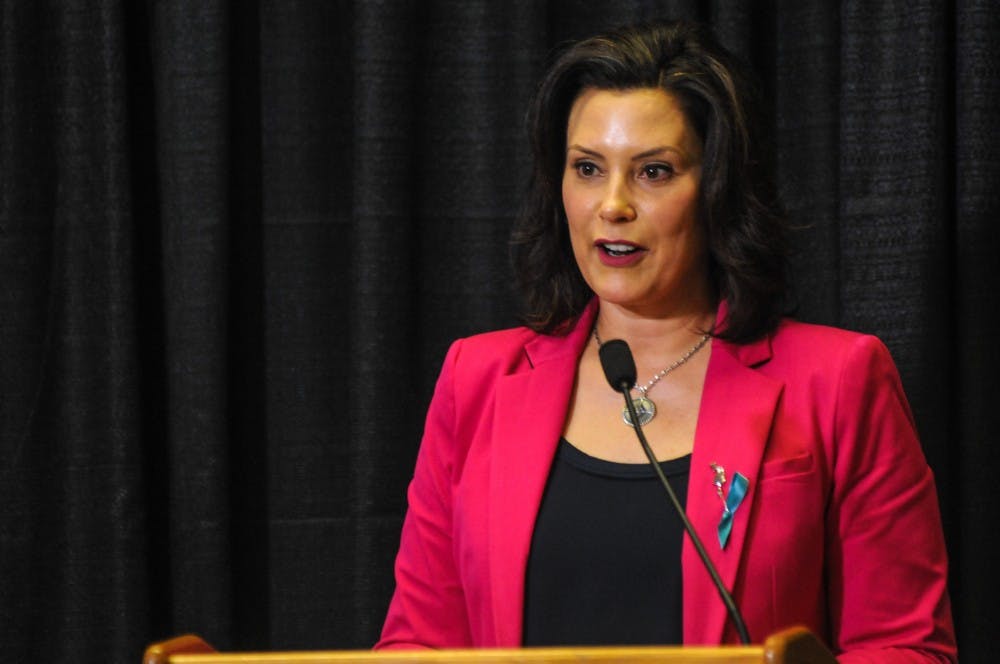A state’s budget is one of the most impactful pieces of legislation a state government can pass, but the legalese, political language, and fighting among lawmakers can make it one of the most confusing laws for the average citizen to decipher, despite its effect on our everyday lives.
When Governor Gretchen Whitmer took office after the November 2018 election, the Michigan government became split. The executive branch houses a Democratic governor, but the legislative branch houses a Republican-majority state Congress.
“I think at the end of the day, both sides are trying to advance what they believe is best for the state of Michigan, and Republicans believe that we need to keep government in check and keep government spending in check,” Michigan Republican Party Communications Director Tony Zammit said.
During her campaign, Whitmer focused heavily on fixing Michigan’s roads and water. The budget in its current form, written by Whitmer and State Budget Director Chris Kolb, aims to repair roads, fund schools, bring back industry jobs and more.
Strategic Communications Specialist for the State Budget Office Jenni Riehle said via email that the current budget provides $2.5 billion in dedicated annual revenue for roads and bridges, increases in per-pupil funding and distributes almost $200 million through social programs.
The governor’s office has additional information on the proposed budget online.
A potential shutdown?
“The biggest hurdle we face today is enacting a budget before the end of the fiscal year,” Riehle said. “If a budget is not passed by Oct. 1, there is the potential for the government to shut down, which all parties are eager to avoid.”
The budget could have a serious impact if it does not pass. A resulting government shutdown would mean state-funded institutions would be shut down until a budget is passed, and schools would not receive state aid.
A shutdown has not happened in Michigan since 2009. Riehle said that negotiations with the state Legislature are ongoing.
“State employees who live in East Lansing ... they would suffer,” East Lansing Mayor Pro Tem Erik Altmann said.
Altmann said that, while East Lansing residents would feel the effects of a shutdown, city-funded operations would continue.
“In terms of the day-to-day trash removal, recycling and city hall — that’s all stuff that would keep on running. Day-to-day city activities would probably continue, at least for a while, largely unchanged,” Altmann said.
If a government shutdown were to occur, Michigan State University would lose a portion of its funding, although “not a ton,” according to Altmann. However, he expects operations to be affected regardless.
“The effects of these sorts of shutdowns are a little hard to predict, but they are almost always more far-reaching than anybody can anticipate,” Altmann said.
Infrastructure
“Governor Whitmer proposed a pretty significant expansion for our infrastructure,” East Lansing City Council Member Aaron Stephens said.
The budget is facing fierce opposition from the Republican-led legislature primarily due to tax increases, the most controversial being a 45-cent-per-gallon tax hike on gasoline.
“So far, Republicans have not yielded any kind of other proposal that would put the investment in our roads that the governor has wanted,” Stephens said. “A shift here or there in our budget isn’t going to do much for it. It’s got to be a real investment.”
Stephens stressed the importance of roads and infrastructure on the average Michigander.
Support student media!
Please consider donating to The State News and help fund the future of journalism.
“The governor’s budget would mean more money for roads that maybe even cities don’t have jurisdiction over. You’re looking at roads like Saginaw, and highways and areas where you’ve had a lot of potholes,” Stephens said. “You think ‘oh well, it’s my city. It’s my city,’ when in fact, it’s your state that’s not putting the money and investment in the roads.”
Republican and Democratic lawmakers both agree that fixing the roads is a primary concern, but Republicans disagree with the gas tax proposed by Whitmer.
“We fundamentally disagree with the governor’s position to raise taxes on what would end up being the highest gas tax in the nation with a 45 cent increase,” Zammit said.
Education
College students could be impacted by the budget as well. The proposed budget increases funding for universities, limits tuition increases, and adults past the traditional college age could see affordable or tuition-free certification programs.
“University and community colleges would receive a three percent increase in operation funding. To further help students and families, universities will be required to hold tuition increases to no more than inflation-plus-one percent to be eligible for the funding increase,” Riehle said.
That limiting figure is 3.2% in 2019.
Riehle said that the proposed budget funds the creation of a Michigan Reconnect Program, which provides opportunities for adults past traditional college age to seek training, certification or associate’s degrees in specialized careers. Eligible participants would receive tuition-free training.
“Once you graduate, the conversation is ‘where do I go now?’ We see a lot of people moving out of Michigan, taking their talent elsewhere. I think Governor Whitmer is definitely putting priority with an investment in jobs and talents development to keep people here in the state and maintain some of our job market,” Stephens said.
Writing a state’s budget is not a simple task, even when it isn’t facing opposition from within its own government.
The Budget Office said that the biggest hurdle when writing the budget was finding a method to increase revenue.
“The state’s general fund revenue has not grown in the last 20 years, leaving us with less money to support the state as inflation continues to rise,” Riehle said. “Without a dedicated revenue source for these projects, like the 45 cent gas tax that is being proposed by the governor for roads, it becomes increasingly difficult to fund projects of that size without devastating cuts to other important programs and services.”
Discussion
Share and discuss “How the state budget affects the East Lansing community” on social media.








